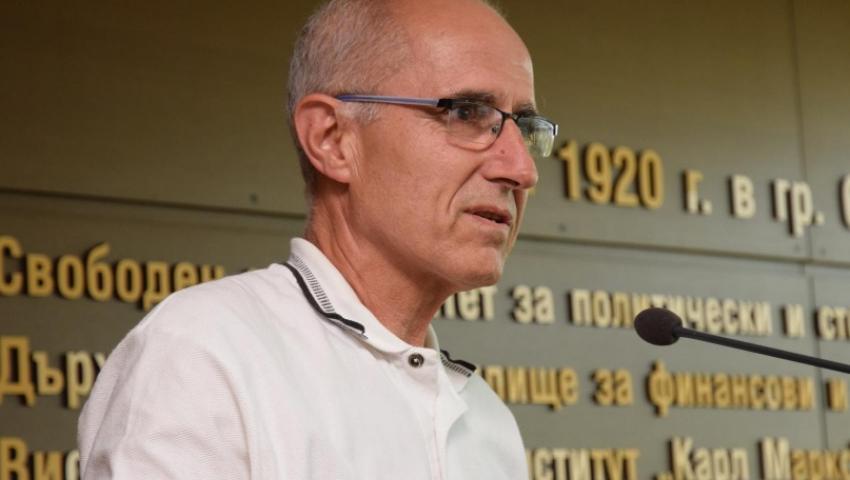Stanislav Georgiev, Bulatom: The war changed the view of the green deal

source: UNWE
The war changed all views on the "green deal". We are witnessing a discussion in Germany on the possibilities for extending the life of the three nuclear power plants, which had to be shut down in 2022 by 10 years. This was commented to BNT by the executive secretary of "Bulatom" Stanislav Georgiev.
"We are witnessing a renaissance of nuclear energy. The United States first announced the construction of new nuclear units. Just weeks ago, the French president (Emmanuel Macron) announced that he was launching a new program in France to build 16 units, 10 of which were modernized and 6 new (energy) units. We are witnessing the continuation of nuclear power plants in Turkey, in Egypt. At least for the time being, we are witnessing the opinion of Hungary that it is not giving up on the Paks 2 project with the Russian side. So, nuclear energy is back on the scene. It is a tool for countries that do not have the energy resources to solve their problems. Bulgaria is somewhat in a similar state. However, we have had a lignite resource for about 50 years, given that the Maritsa East units are operating. If new units are built, this period will most likely be reduced, but we cannot meet our basic needs, Georgiev said.
According to him, most likely the green deal, which was considered a period of implementation until 2050 as a deadline, will be extended. "It is likely that this time frame will be extended." War is war and cannot be avoided," he said.
According to Stanislav Georgiev, "Nuclear energy is an instrument with which Bulgaria can guarantee its independence." In this regard, however, he clarified that decisions in this area have always been political.
"Decisions in nuclear energy have always been political. They have never depended on the opinions of nuclear experts. Let's not go back. "The Belene project itself has been launched and stopped several times for political reasons," he said.
The expert commented on the situation of fear due to the Zaporozhye NPP and the emerging states of fear.
"Drinking iodine is not necessary at the moment. Firstly, it is not good from a health point of view, and secondly, what happened to the gas stations a few days ago could happen," he said.
Regarding the fire in the area of the Ukrainian Zaporozhye NPP (Zaporozhye NPP), after which it was announced that there was no leakage of radiation and for which Kyiv and Moscow blame each other, Georgiev praised the fact that all institutions in Bulgaria whose work is to clarify such issues, this time they spoke in one voice, and not only the Bulgarian institutions, but also the International Organization for Nuclear Energy in Vienna.
"What is being said is that there is no nuclear situation at the plant. There is no danger for the Bulgarian population. My appeal is to all those who listen to us, watch us, let them comply with what the Bulgarian authorities say and do not panic." said Georgiev.
Even before this incident, the Zaporozhye plant was under the control of Russian forces, recalled the secretary of Bulatom.
"What exactly happened, the two sides give different versions. What is absolutely dangerous, however, is that such things are happening in a nuclear power plant. And the chairman of our Nuclear Regulatory Agency was very right to say that we are worried about this." "We must be worried because it is a nuclear power plant, although it is very different in structure and protection from what Chernobyl was," he said.
Stanislav Georgiev expressed hope that both sides understand that these are special sites, that they should have a special status and that no battles should be allowed with them. According to him, these facilities are the basis of Ukraine's energy, and this is the basis on which normal life can be built after the war.
Asked whether provocations were possible, Bulatom's executive secretary was succinct that anything was possible.
"Unfortunately, in this world, anything is possible. I hope this will not happen. I hope that both sides understand that these are objects that must be preserved, as has always been the case in such conflicts. For example, in the former Yugoslavia - there the headquarters was surrounded from afar in all hostilities."
On the occasion of the entry of Russian troops on the territory of the decommissioned Chernobyl NPP, Stanislav Georgiev pointed out that one of the versions of this reaction is the expressed intention of Ukraine to become a nuclear state. In this sense, he explained the difference between the current nuclear power plants and that of Chernobyl.
